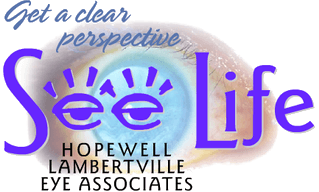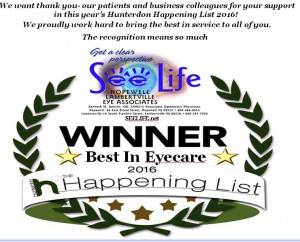Thanksgiving and Eye Health : Vitamins, nutrients in holiday foods could benefit eye health: Eat Well - See Well: www.seelife.net
Eating well reflects not only on your overall health but also your eyesight. Colors in your food will allow you to continue to see the beautiful colors of the seasons and your life. Eye-friendly nutrients, such as lutein and zeaxanthin, vitamin C, vitamin E and zinc, to reducing the risk of certain serious eye diseases like age-related macular degeneration and cataracts. You can find these antioxidants in green leafy vegetables, fruits, nuts and a lot of other foods.
It's not only the holiday greens, but also the yellows, reds and oranges of a nutrient-rich diet that contribute to an eye-healthy smorgasbord this Thanksgiving. Enjoy the turkey – the colorful vegetables and just a little less the carbs. Let’s think of Thanksgiving and being thankful for your health and well being.
Called carotenoids, those colorful pigments in fruits and vegetables—even the vibrant Fall foliage—are powerful antioxidants that protect against cellular damage, and when combined with other essential vitamins and nutrients provide health benefits vital for aging eyes.
Vitamins C and E, zinc, lutein, zeaxanthin and omega-3 fatty acids all play important roles in reducing the risks for certain eye diseases. In fact, prevalent National Eye Institute research, called the Age-Related Eye Disease Studies (AREDS and AREDS2), found that increased antioxidant vitamin intake reduced advanced age-related macular degeneration (AMD) risk by about 25%, and reduced vision loss by 19%. So, too, other recent studies showed that higher vitamin C and E intake lowered overall cataract risk and progression.
Thanksgiving meals aren't typically renowned for their healthy fare; but a few conscious menu choices could offer the family healthy options not only beneficial for eye health, but also for overall health. Thanksgiving is sometimes interpreted as a "free pass to eat it all," anything in moderation is a good rule most dieticians use.
"For ocular nutrition, the rules don't really change—more fruit and veggies, and the more raw, or non-prepared, the better,"
Want to eat eye-healthy this Thanksgiving? Here are 3 menu tips for staying eye healthy this Thanksgiving
- Mindful menu options. "People don't feel deprived on the holidays if you can make delicious, healthy substitutions," Try giving these traditional choices a healthy overhaul.
Cauliflower: Instead of the carb-laden mashed, white potatoes, try mashed cauliflower instead. Steam a head of cauliflower and mince in the food processor until the proper consistency is reached, Dr. Carver says. Add sautéed leeks. Cauliflower is a very good source of vitamin C and omega-3s, both linked to proper visual development.
Sweet potatoes: Try sweet potato oat bars, packed with healthy fats. Combine 5 baked and skinned sweet potatoes with 4 cups oats, 2 Tbsp. pumpkin pie spice, 2 Tbsp. coconut oil, ½ Tbsp. maple syrup, ¼ cup ground flax seed, ¾ cup coconut milk soured with 1 Tbsp. lemon juice, 1 tsp. salt, ½ dried fruit of choice and ½ cup chopped nuts of choice. Combine and bake in a 400-degree oven for 30 minutes. Sweet potatoes also are very good sources of vitamin C, as are fruits, and nuts are excellent sources of vitamin E. These vitamins can help slow progression of AMD and protect cells in the eyes from free radicals that break down healthy tissue.
2.Think color. Fill your plate with a rainbow of foods with carotenoids "Dark, leafy greens such as kale, spinach and collards have lutein, which is important for good macular function. Carrots and pumpkin are great sources of beta carotene and vitamin C,"
3. Change it up. Instead of cooking "special items" for that one person in the family with a food allergy, diabetes or other dietary restriction, cook enough for the whole family to benefit. In his house, "we will have turkey and salmon,” Salmon is loaded with eye-rich nutrients, including zinc and omega-3 fatty acids. Zinc plays an essential role in bringing vitamin A from the liver to the retina in order to produce melanin, the protective pigment in the eyes.
But proper nutrition is only a part of the healthy eyes menu. It's regular, comprehensive dilated eye examinations that represent the most important portion of the preventive eye health equation. Many common eye diseases have no obvious signs or symptoms, and early diagnosis and intervention can help ward off vision loss.
All eyes on these vitamins and nutrients
For good eye health, look to these key vitamins and nutrients:
- Lutein & Zeaxanthin: Many studies show that lutein and zeaxanthin reduce the risk of chronic eye diseases. People who got the most lutein and zeaxanthin had a much lower risk for developing new cataracts. Dark green leafy vegetables are the primary source of lutein and zeaxanthin, as well as other colorful fruits and vegetables like broccoli, corn, peas, persimmons and tangerines.
- Vitamin C: Scientific evidence suggests vitamin C lowers the risk of developing cataracts and when taken in combination with other essential nutrients, it can slow the progression of age-related macular degeneration and visual acuity loss. For your daily dose, try incorporating oranges, grapefruit, strawberries, papaya, green peppers and tomatoes into your diet.
- Vitamin E: Vitamin E protects cells in the eyes from unstable molecules called free radicals, which break down healthy tissue. Good food sources of Vitamin E include vegetable oils (including safflower and corn oil), nuts, wheat germ and sweet potatoes.
- Essential fatty acids: Omega-3 fatty acids are important for proper visual development and retinal function. Studies in pre-term and full-term infants suggest that getting enough omega-3 fatty acids in the diet is essential for optimal visual development. Salmon, tuna and other cold-water fish are the best sources of omega-3 fatty acids and can help reduce inflammation, enhance tear production and support the eye’s oily outer layer.
- Zinc: Zinc plays a vital role in bringing vitamin A from the liver to the retina in order to produce melanin, a protective pigment in the eyes. Impaired vision, such as poor night vision and cloudy cataracts, has been linked to zinc deficiency. For natural dietary sources of zinc, try red meat, oysters and other shellfish, and nuts and seeds.






